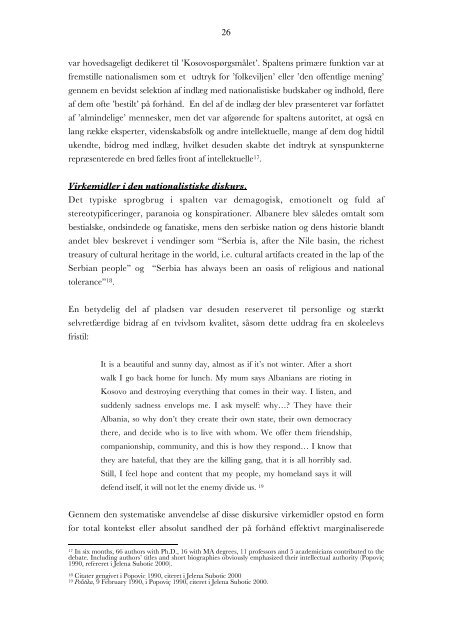et illiberalt demokrati - hofhr
et illiberalt demokrati - hofhr
et illiberalt demokrati - hofhr
You also want an ePaper? Increase the reach of your titles
YUMPU automatically turns print PDFs into web optimized ePapers that Google loves.
26<br />
var hovedsageligt dediker<strong>et</strong> til ’Kosovospørgsmål<strong>et</strong>’. Spaltens primære funktion var at<br />
fremstille nationalismen som <strong>et</strong> udtryk for ’folkeviljen’ eller ’den offentlige mening’<br />
gennem en bevidst selektion af indlæg med nationalistiske budskaber og indhold, flere<br />
af dem ofte ’bestilt’ på forhånd. En del af de indlæg der blev præsenter<strong>et</strong> var forfatt<strong>et</strong><br />
af ’almindelige’ mennesker, men d<strong>et</strong> var afgørende for spaltens autorit<strong>et</strong>, at også en<br />
lang række eksperter, videnskabsfolk og andre intellektuelle, mange af dem dog hidtil<br />
ukendte, bidrog med indlæg, hvilk<strong>et</strong> desuden skabte d<strong>et</strong> indtryk at synspunkterne<br />
repræsenterede en bred fælles front af intellektuelle 17.<br />
Virkemidler i den nationalistiske diskurs.<br />
D<strong>et</strong> typiske sprogbrug i spalten var demagogisk, emotionelt og fuld af<br />
stereotypificeringer, paranoia og konspirationer. Albanere blev således omtalt som<br />
bestialske, ondsindede og fanatiske, mens den serbiske nation og dens historie blandt<br />
and<strong>et</strong> blev beskrev<strong>et</strong> i vendinger som “Serbia is, after the Nile basin, the richest<br />
treasury of cultural heritage in the world, i.e. cultural artifacts created in the lap of the<br />
Serbian people” og “Serbia has always been an oasis of religious and national<br />
tolerance” 18.<br />
En b<strong>et</strong>ydelig del af pladsen var desuden reserver<strong>et</strong> til personlige og stærkt<br />
selvr<strong>et</strong>færdige bidrag af en tvivlsom kvalit<strong>et</strong>, såsom d<strong>et</strong>te uddrag fra en skoleelevs<br />
fristil:<br />
It is a beautiful and sunny day, almost as if it’s not winter. After a short<br />
walk I go back home for lunch. My mum says Albanians are rioting in<br />
Kosovo and destroying everything that comes in their way. I listen, and<br />
suddenly sadness envelops me. I ask myself: why…? They have their<br />
Albania, so why don’t they create their own state, their own democracy<br />
there, and decide who is to live with whom. We offer them friendship,<br />
companionship, community, and this is how they respond… I know that<br />
they are hateful, that they are the killing gang, that it is all horribly sad.<br />
Still, I feel hope and content that my people, my homeland says it will<br />
defend itself, it will not l<strong>et</strong> the enemy divide us. 19<br />
Gennem den systematiske anvendelse af disse diskursive virkemidler opstod en form<br />
for total kontekst eller absolut sandhed der på forhånd effektivt marginaliserede<br />
17 In six months, 66 authors with Ph.D., 16 with MA degrees, 11 professors and 5 academicians contributed to the<br />
debate. Including authors’ titles and short biographies obviously emphasized their intellectual authority (Popoviç<br />
1990, referer<strong>et</strong> i Jelena Subotic 2000).<br />
18 Citater gengiv<strong>et</strong> i Popovic 1990, citer<strong>et</strong> i Jelena Subotic 2000<br />
19 Politika, 9 February 1990, i Popoviç 1990, citer<strong>et</strong> i Jelena Subotic 2000.


